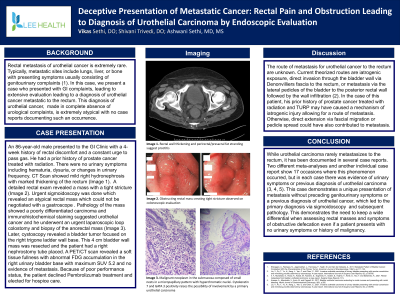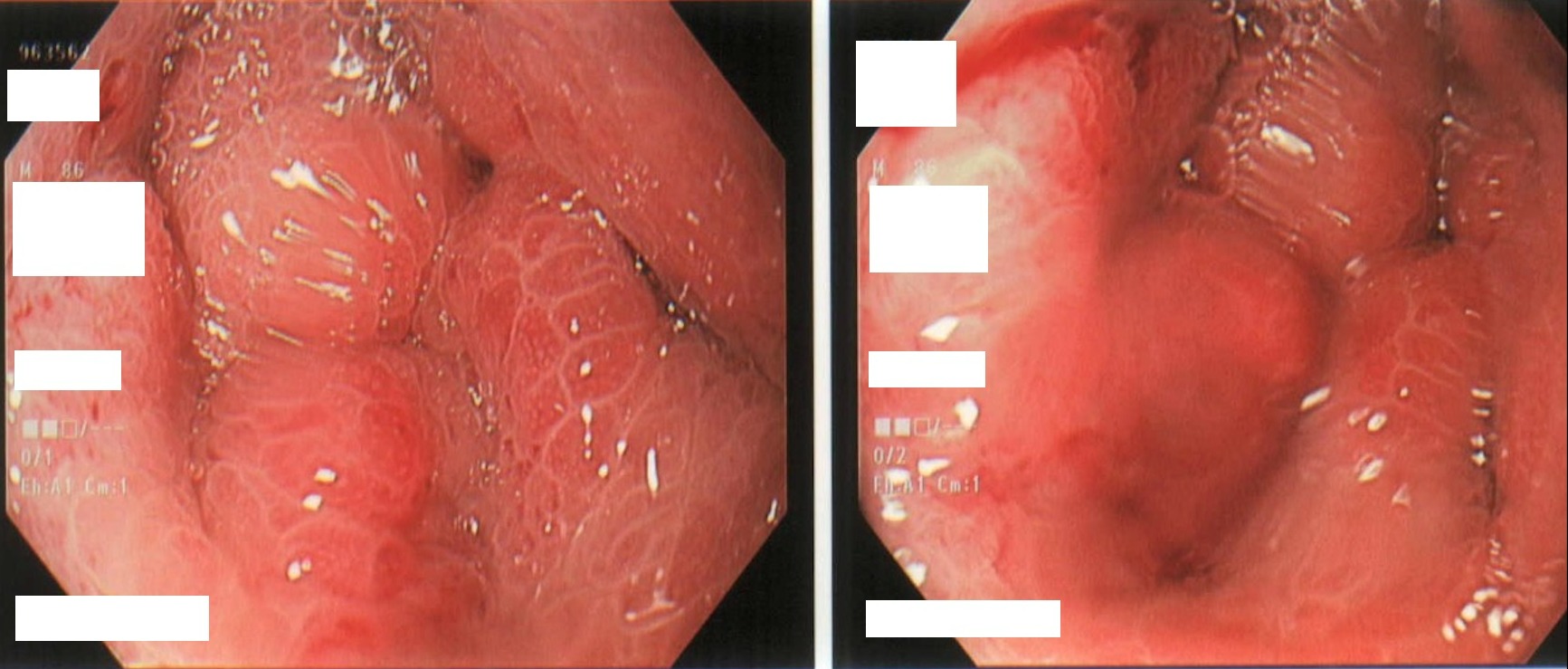Back


Poster Session C - Monday Afternoon
Category: Colon
C0160 - Deceptive Presentation of Metastatic Cancer: Rectal Pain and Obstruction Leading to New Diagnosis of Urothelial Carcinoma by Colonoscopic Evaluation
Monday, October 24, 2022
3:00 PM – 5:00 PM ET
Location: Crown Ballroom

Has Audio

Vikas Sethi, DO
Largo Medical Center
Largo, FL
Presenting Author(s)
Vikas Sethi, DO1, Shivani Trivedi, DO1, Ashwani Sethi, MD2
1Largo Medical Center, Largo, FL; 2Lee Health, Fort Myers, FL
Introduction: Rectal metastasis of urothelial cancer is extremely rare. Typically, metastatic sites include lungs, liver, or bone with presenting symptoms usually consisting of genitourinary complaints (1). In this case, we present a case who presented with GI complaints, leading to extensive evaluation leading to a diagnosis of urothelial cancer metastatic to the rectum. This diagnosis of urothelial cancer, made in complete absence of urological complaints, is extremely atypical with no case reports documenting such an occurrence.
Case Description/Methods: An 86-year-old male presented to the GI Clinic with a 4-week history of rectal discomfort and a constant urge to pass gas. He had a prior history of prostate cancer treated with radiation.. There were no urinary symptoms including hematuria, dysuria, or changes in urinary frequency. CT Scan showed mild right hydronephrosis with marked thickening of the rectum. A detailed rectal exam revealed a mass with a tight stricture. Urgent endoscopy was done which revealed an atypical rectal mass which could not be negotiated with a gastroscope. Pathology of the mass showed a poorly differentiated carcinoma and immunohistochemical staining suggested urothelial cancer and he underwent an urgent laparoscopic loop colostomy and biopsy of the anorectal mass. Later, cystoscopy revealed a bladder tumor focused on the right trigone ladder wall base. This 4 cm bladder wall mass was resected and the patient had a right nephrostomy tube placed. A PET/CT scan revealed a soft tissue fullness with abnormal FDG accumulation in the right urinary bladder base with maximum SUV 5.2 and no evidence of metastasis. Because of poor performance status, the patient declined Pembrolizumab treatment and elected for hospice care.
Discussion: While urothelial carcinoma rarely metastasizes to the rectum, it has been documented in several case reports. Two different meta-analyses and another individual case report show 17 occasions where this phenomenon occurred, but in each case there was evidence of urinary symptoms or previous diagnosis of urothelial carcinoma (2, 3, 4). This case demonstrates a unique presentation of metastasis without preceding genitourinary symptoms or a previous diagnosis of urothelial cancer, which led to the primary diagnosis via colonoscopy and subsequent pathology. This demonstrates the need to keep a wide differential when assessing rectal masses and symptoms of obstructive defecation even if a patient presents with no urinary symptoms or history of malignancy.

Disclosures:
Vikas Sethi, DO1, Shivani Trivedi, DO1, Ashwani Sethi, MD2. C0160 - Deceptive Presentation of Metastatic Cancer: Rectal Pain and Obstruction Leading to New Diagnosis of Urothelial Carcinoma by Colonoscopic Evaluation, ACG 2022 Annual Scientific Meeting Abstracts. Charlotte, NC: American College of Gastroenterology.
1Largo Medical Center, Largo, FL; 2Lee Health, Fort Myers, FL
Introduction: Rectal metastasis of urothelial cancer is extremely rare. Typically, metastatic sites include lungs, liver, or bone with presenting symptoms usually consisting of genitourinary complaints (1). In this case, we present a case who presented with GI complaints, leading to extensive evaluation leading to a diagnosis of urothelial cancer metastatic to the rectum. This diagnosis of urothelial cancer, made in complete absence of urological complaints, is extremely atypical with no case reports documenting such an occurrence.
Case Description/Methods: An 86-year-old male presented to the GI Clinic with a 4-week history of rectal discomfort and a constant urge to pass gas. He had a prior history of prostate cancer treated with radiation.. There were no urinary symptoms including hematuria, dysuria, or changes in urinary frequency. CT Scan showed mild right hydronephrosis with marked thickening of the rectum. A detailed rectal exam revealed a mass with a tight stricture. Urgent endoscopy was done which revealed an atypical rectal mass which could not be negotiated with a gastroscope. Pathology of the mass showed a poorly differentiated carcinoma and immunohistochemical staining suggested urothelial cancer and he underwent an urgent laparoscopic loop colostomy and biopsy of the anorectal mass. Later, cystoscopy revealed a bladder tumor focused on the right trigone ladder wall base. This 4 cm bladder wall mass was resected and the patient had a right nephrostomy tube placed. A PET/CT scan revealed a soft tissue fullness with abnormal FDG accumulation in the right urinary bladder base with maximum SUV 5.2 and no evidence of metastasis. Because of poor performance status, the patient declined Pembrolizumab treatment and elected for hospice care.
Discussion: While urothelial carcinoma rarely metastasizes to the rectum, it has been documented in several case reports. Two different meta-analyses and another individual case report show 17 occasions where this phenomenon occurred, but in each case there was evidence of urinary symptoms or previous diagnosis of urothelial carcinoma (2, 3, 4). This case demonstrates a unique presentation of metastasis without preceding genitourinary symptoms or a previous diagnosis of urothelial cancer, which led to the primary diagnosis via colonoscopy and subsequent pathology. This demonstrates the need to keep a wide differential when assessing rectal masses and symptoms of obstructive defecation even if a patient presents with no urinary symptoms or history of malignancy.

Figure: Obstructive rectal mass visualized on colonoscopic evaluation
Disclosures:
Vikas Sethi indicated no relevant financial relationships.
Shivani Trivedi indicated no relevant financial relationships.
Ashwani Sethi indicated no relevant financial relationships.
Vikas Sethi, DO1, Shivani Trivedi, DO1, Ashwani Sethi, MD2. C0160 - Deceptive Presentation of Metastatic Cancer: Rectal Pain and Obstruction Leading to New Diagnosis of Urothelial Carcinoma by Colonoscopic Evaluation, ACG 2022 Annual Scientific Meeting Abstracts. Charlotte, NC: American College of Gastroenterology.
